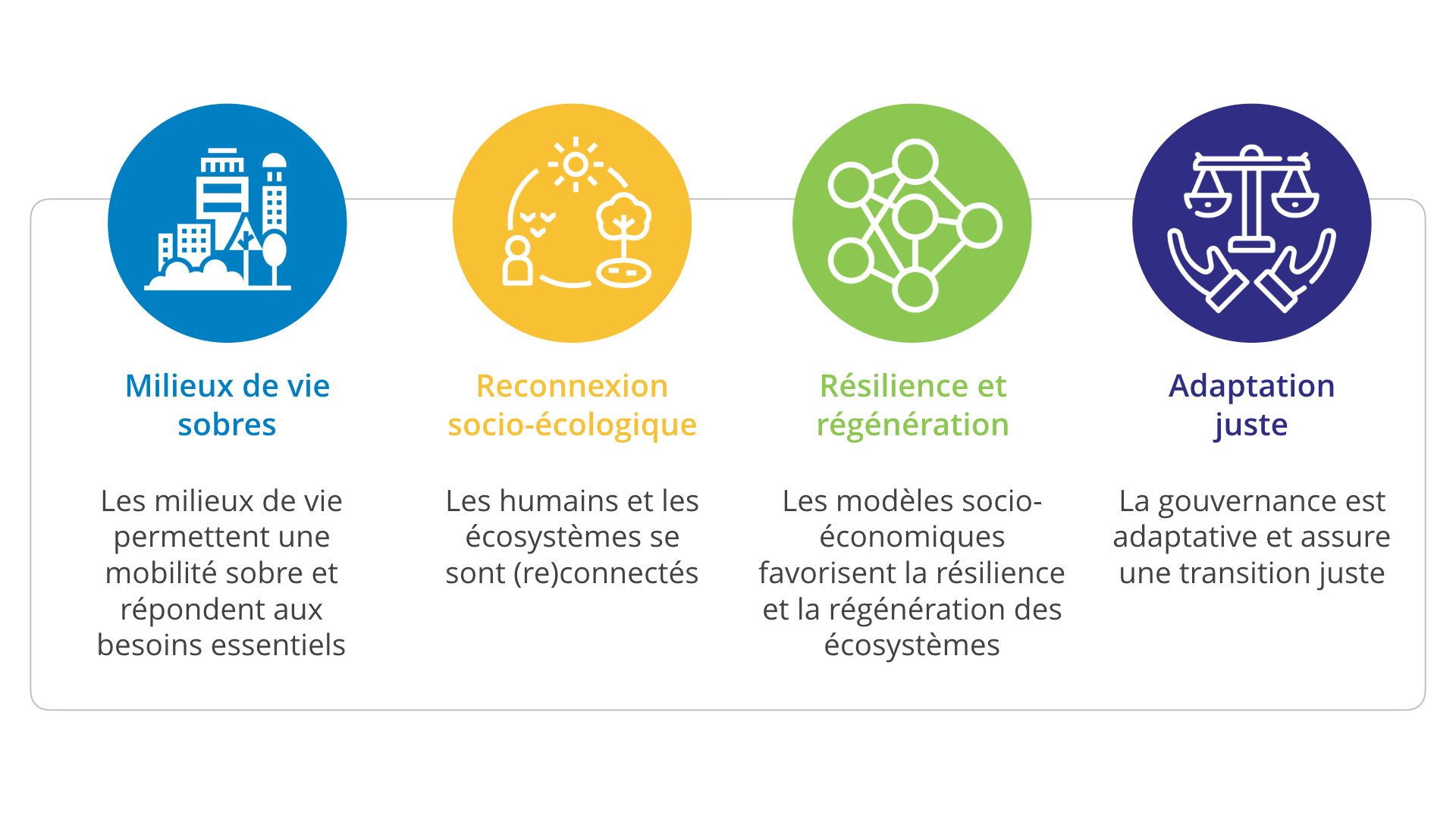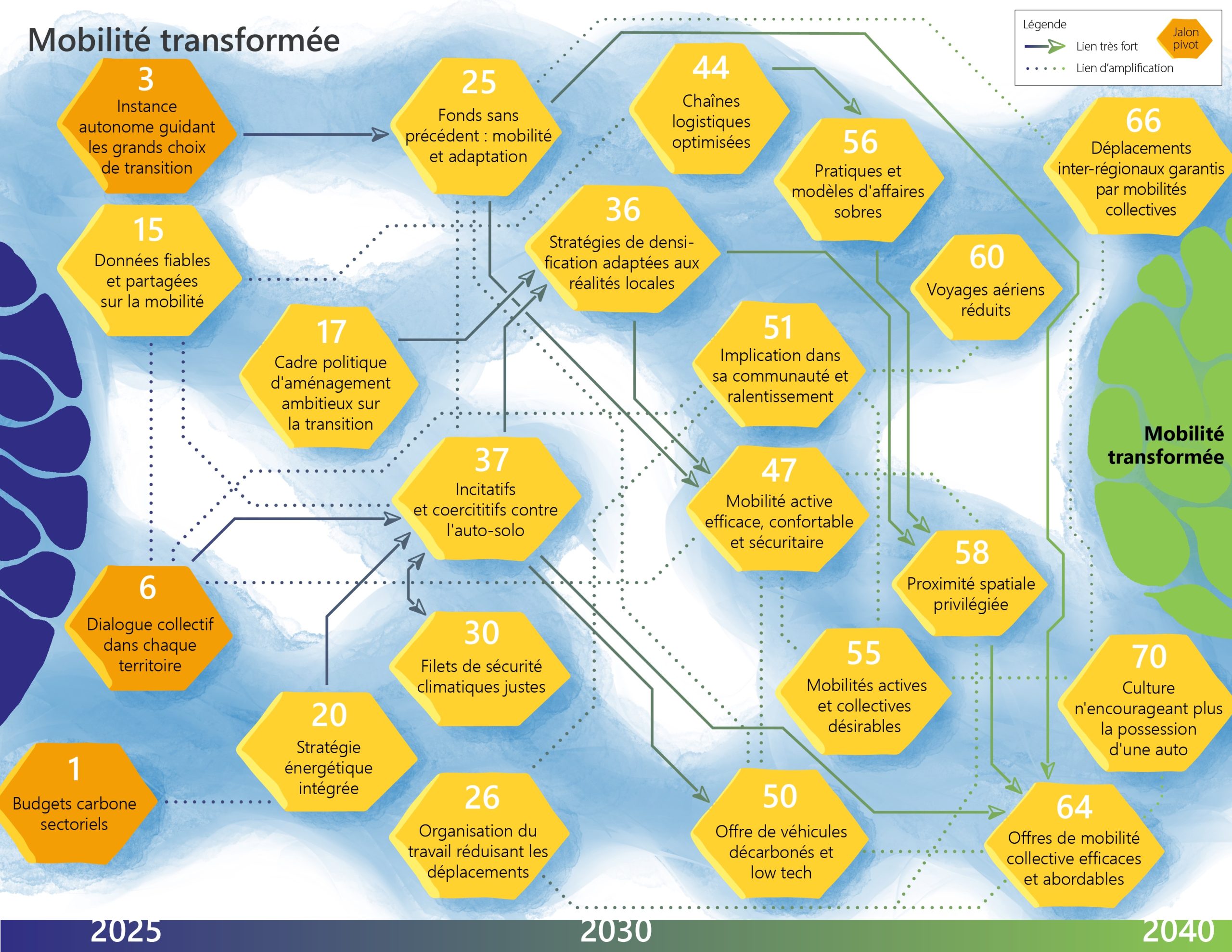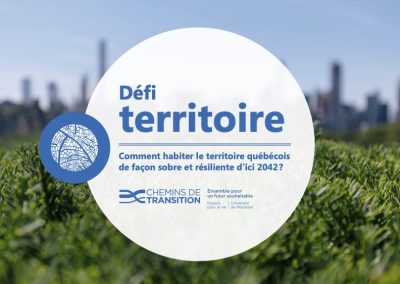Cities, Climate and Inequalities
Setting just transition milestones: Chemins de transition challenges Quebecers to envision a sustainable future
February 2024
Franck Scherrer, Professor at the École d’urbanisme et d’architecture de paysage (Université de Montréal) and Jeanne Paré, master’s cadidate in urban planning (Université de Montréal)
Introduction
Climate change poses a growing threat to our quality of life and the long-term stability of Quebec society. Most obviously, headline-grabbing events like heat waves, floods, and forest fires are becoming more frequent, intense, and widespread. But it is important to remember that climate change does not impact everyone equally (INSPQ, 2021), and that the most vulnerable populations have traditionally played a very limited role in environmental decision-making (Proux and Prémont, 2020). In any case, efforts to achieve a just transition cannot be limited to building a more sustainable and resilient relationship with nature. We also need to ensure that the process remains fair, equitable, and inclusive. We cannot afford to lose sight of the social issues that are intrinsically connected to the collected decisions that need to be made regarding the environment.
So, how do we move forward? To help answer this question, Chemins de transition launched a three-year project called “Défi territoire.” Based on a forward-looking and participatory approach, it challenged academic researchers and leading community stakeholders to reflect on Quebec’s future. Given that some form of transition is inevitable, and that it would be preferable for Quebecers to have at least some say in the matter, the aim was to imagine positive changes that could be implemented by 2042.
Below, we provide a summary of the process and discuss some of the solutions put forward for changing our approach to land-use planning in ways that enjoy public support, reflect Quebec society in all its diversity, and promote both social and climate justice.
Theoretical Framework
Chemins de transition is committed to the mobilization and sharing of knowledge relevant to Quebec’s social and environmental transition. The initiative is supported by the Université de Montréal and Espace pour la vie, a Montreal-based flagship institution dedicated to conducting and disseminating research in the natural sciences. In particular, Chemins de transition aims to provide a critical mass of diverse individuals and organizations with the tools they need to map out a desirable future and rally support for achieving their shared vision. Doing so requires a willingness to make tough future-oriented choices for ensuring resilience in the face of various impacts associated with environmental disruption, all while maintaining a focus on equity. This approach builds on sustainability transition theory, especially as it relates to transition management practices, which focus on managing systemic change through reflexive governance (Audet, 2015). More specifically, Chemins de transition works to provide stakeholders with a stable and well-equipped “transition arena” where they can develop long-term visions and then map out the corresponding “transition pathways” (Loorbach, 2007). From 2020 to 2022, the Défi territoire project made unprecedented use of strategic foresight (prospective diagnosis, scenario building around possible futures, back-casting) and collective speculation (design fiction, prospective co-design) to mobilize “knowledge about futures” from a range of viewpoints—including scientific, professional, activist, experiential, and citizen perspectives.
Défi territoire: Taking a Forward-Looking Approach
Systemic change will be necessary to cope with the social and environmental impacts of climate change. Indeed, the sheer magnitude of the emerging crisis has been forcing Quebecers to reflect on possible futures. In response, Chemins de transition has adopted a forward-looking approach designed to harness the collective capacity for imagining desirable futures and mapping out ways of getting there. By guiding both short-term and long-term efforts, such a process can help shape a transition that is both participatory and democratic.
Between July 2020 and December 2022, participants in the Défi territoire project contributed a wide array of knowledge capable of informing new ways of living that could be introduced over the next two decades (i.e., by 2042). In fact, the project’s ability to mobilize diverse forms of knowledge is part of what made it so groundbreaking. Scientists and academics discussed research findings from their own fields and beyond. Professionals contributed know-how drawn not only from Quebec but from international contexts as well. Activists and ordinary citizens shared their experiences and perspectives. In all, more than 500 people from a range of backgrounds participated. They included members of the public, representatives of organizations, and experts in various fields. The four-stage process involved (1) imagining possible futures based on current knowledge, (2) building desirable scenarios for the future through participatory workshops, (3) identifying pathways for achieving those scenarios, and (4) sharing the knowledge gathered throughout the project.
As hoped, a promising vision for life in Quebec emerged from the process:
By 2042, Quebec society will have embraced diverse ways of living that contribute to a social and environmental transition. These ways of living will avoid overtaxing the Earth’s resources while still meeting the basic needs of the population. Compromises will have been made to ensure that models adopted in specific contexts align with an overall approach that promotes coherence, equity, and cooperation.

Overview of the vision for life in Quebec in 2042, as developed through the forward-looking and participatory approach adopted by Chemins de transition. Source: Chemins de transition, Comment habiter le territoire québécois de façon sobre et résiliente d’ici 2042? (2023).
Just Transition Milestones: Key Steps Toward Achieving Transformational Adaptation in Quebec
It would be impossible to achieve a just transition without involving the entire community from the outset. In particular, groups that have traditionally been excluded from land use discussions need to have their say on what form the transition will take. Perfectly aligned with the approach adopted by Chemins de transition, this concern is reflected in one of the first just transition milestones to come out of the project, namely the urgent need to ensure implementation of support mechanisms that allow marginalized groups and individuals to actively participate in decision-making and have a say in how decisions are implemented. This will require efforts to ensure that, from the earliest stages of the transition, the most vulnerable groups in Quebec society actively participate in the decision-making process. After all, these groups are on the front lines of climate change and often bear the brunt of its social and economic impact. All of which points to another essential milestone: ensuring that knowledge drawn from multiple generations and cultures, including Indigenous cultures, is widely disseminated and serves as the basis for solutions that support the environmental transition. Indeed, a just transition cannot be achieved without considering diverse forms of knowledge (environmental, traditional, Indigenous, experiential, local, etc.) that have yet to be widely acknowledged by decision makers and academic researchers. Recognizing and considering a diversity of knowledge systems will not only support inclusive participation but also help avoid a siloed approach to land-use management. These two milestones rooted in social justice—ensuring broad public participation and sharing diverse forms of knowledge—absolutely need to be reached before work begins on achieving objectives of a strictly environmental nature. Fair and equitable climate action is simply not possible without a truly democratic decision-making process and consideration of all available sources of knowledge. Furthermore, a more just and equitable society will be more resilient in the face of future environmental challenges. For example, the resulting social cohesion would facilitate decision-making and action in the face of difficult choices.
The forward-looking, participatory approach used in the Défi territoire project also helped identify a number of mobility-related milestones, all of which relate to achieving a decarbonized, more energy-efficient, and more sustainable transportation system by 2042. For example, project participants recommended taking measures to disincentivize solo car use, in pursuit of a world where car culture no longer encourages private vehicle ownership and where public transportation is efficient and affordable. Beyond a carbon or mileage tax, such disincentives would also include various fiscal and regulatory measures designed to make solo car use more expensive and less desirable.
However, efforts to achieve these environmentally focused milestones related to mobility must not be allowed to overshadow issues of equity and social justice. For example, access to safe active transportation infrastructure tends to be unevenly distributed. This is true not only within cities, but also across Quebec as a whole. Likewise, in many regions, efficient and affordable public transportation continues to be considered a “luxury,” leaving residents with little choice but to rely on private vehicles. And since wealthier individuals can more easily absorb the financial impact, any increase in the cost of private vehicle ownership would disproportionately affect low-income populations. So although disincentivizing solo car use might initially seem like an obvious response to the climate crisis, it also risks reproducing and reinforcing existing social inequalities. To avoid this kind of paradoxical outcome, other key milestones must be prioritized so that environmental measures do not trigger excessive social costs.
In terms of mobility, Chemins de transition has proposed the introduction of fair climate rebates designed to address the unequal burden imposed by such measures, alongside the creation of a community forum to discuss essential transportation needs. An equalization system has also been proposed to ensure that different Quebec regions are treated fairly, since the impact of measures to reduce car use would be greater in areas with fewer active and public transportation options.

Milestones included under the “Mobility Transformation” theme as part of the transition pathways identified through the Défi territoire project. Source : Chemins de transition, Comment habiter le territoire québécois de façon sobre et résiliente d’ici 2042? (2023).
One essential step in achieving a just transition by 2042 involves promoting, within the non-Indigenous population, ways of living that facilitate and support reconciliation with First Peoples. Coexistence and mutual recognition can be fostered not only through equity and land sharing measures, but especially through the adoption of governance structures that allow interested Indigenous communities to play a central role in the search for climate change solutions and land-use adaptations. Quebecers can also support measures for fighting and adapting to climate change on an international level. By acknowledging its share of responsibility for the global environmental crisis and the latter’s impact on other parts of the world, Quebec could increase its financial support for climate change mitigation and adaptation efforts in more vulnerable countries. In the longer term, Quebec could also show solidarity with those parts of the world hardest hit by climate disruption by increasing its capacity to welcome climate migrants, and provide them with an opportunity to lead a dignified and fulfilling life.
Conclusion
The path toward a more sustainable and resilient Quebec by 2042 consists of multiple stages, each of which lays the groundwork for the following one. The forward-looking, participatory approach adopted by Chemins de transition has made it possible to identify certain preliminary steps that need to be taken first. This will ensure that the transition to a desirable future reduces social inequality, in keeping with a fuller understanding of climate justice. Indeed, unless certain milestones are reached before others, we risk subjecting our fellow human beings to the same dynamics of oppression and subjugation that have characterized our relationship with nature for far too long. In other words, we risk reproducing the very patterns of behaviour that created the climate crisis.
Accordingly, the key milestones identified through the Défi territoire project include the involvement of marginalized groups in decision-making, the valuing of knowledge diversity, the adoption of measures to offset those aspects of the transition that would otherwise place an unfair burden on certain socio-economic groups, the establishment of a community forum for discussing future changes, the inclusion of First Peoples in transition governance structures, and solidarity with the inhabitants of other parts of the world. These milestones serve as an invitation to strive for a transition defined by procedural and distributive justice, and to ensure that the required systemic changes benefit everyone.
To cite this article
Scherrer, F., Paré, J. (2024). Setting just transition milestones: Chemins de transition challenges Quebecers to envision a sustainable future. In Cities, Climate and Inequalities Collection. VRM – Villes Régions Monde. https://www.vrm.ca/setting-just-transition-milestones-chemins-de-transition-challenges-quebecers-to-envision-a-sustainable-future/
Reference Text
References
Loorbach, D. (2007). Transition management. New mode of governance for sustainable development. Utrecht: International Books.
Proulx, M. U., & Prémont, M. C. (2020). La politique territoriale au Québec: 50 ans d’audace, d’hésitations et d’impuissance. PUQ.
Scherrer, F. (2023) Dir.pub. DÉFI TERRITOIRE – Comment habiter le territoire québécois de façon sobre et résiliente d’ici 2042 ? rapport of Chemin de transition, https://cheminsdetransition.org/download/24/defi-territoire/2875/rapport-final-defi-territoire.pdf

